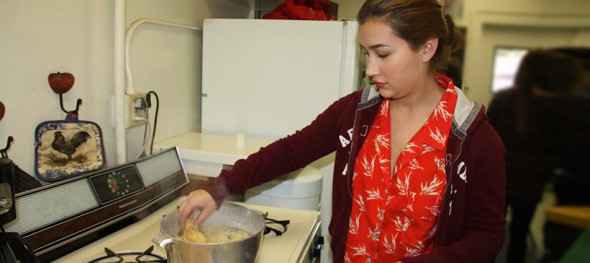‘Talking the Talk’ in Foreign Language Classes

From the Anacapa School Foreign Language Department …
While there are many challenging and complex components to learning a foreign language, (to be able to comprehend, read, translate, and write, etc.), one of the greatest and most important challenges can be pronunciation. Consider for a moment the language of English and some of its confusing pronunciation details. For example, the letter “h” in “hat” is pronounced, but not in “ghost”; the same goes for the letter “k” in “kitten” and in “know.” There are dozens of wonderful pronunciation oddities like the “p” in “psychology” and the “gh” in “right.” “Soap” and “soup” are spelled almost identically but their pronunciation is quite different, and the difference in meaning is considerable! Just imagine going into a restaurant and asking for “soap” instead of “soup”!
It seems clear that pronunciation is a key part to being successful in communicating in a foreign language. It is probably also clear that practice, practice, practice is the key to learning pronunciation. The more the student can hear the language modeled orally and the more the student has a chance to speak orally, the better the student’s pronunciation will be. The small classes at Anacapa are ideal environments for setting up this exact situation! Beyond the obvious benefits of getting to speak orally at least 30 times each class session (versus four or five times in a class of 30+ students), this month Suzie and Hugo share some of the unique advantages Anacapa students have to learn oral proficiency in their Italian and Spanish classes.
Italian – Suzie Sichi
Italian classes are geared to have lots of oral opportunities, both in chorus situations—when several students are saying the same thing at the same time, which is very non-threatening—as well as individually.
First, there is the daily Le notizie, when students share some news in English that is either personal and/or currently interesting, which I write on the board in Italian and the students copy down; the next step is that I read the news out loud and the students repeat after me in chorus. By breaking down the news sentences into manageable chunks and adding phrases together little by little, students practice rhythm, speed, and intonation to refine their pronunciation. (By the way, students in the Italian III class start giving their news in Italian during the second semester!)
Another unique oral opportunity is our weekly culinary session, when we make and eat some tasty Italian dish and speak only Italian the whole time we are in the kitchen and eating! While the students are working, I talk to them, tell stories, explain procedures, ask them questions, and help them to formulate answers, so that essentially it is a weekly immersion session, plus they get to eat!
A third great help is that I monitor their pronunciation challenges and progress on a regular basis, and then I analyze the issues so they can be addressed. This does take some extra time, but with the small classes I can track each student, and each class, over the course of the year; plus, since I have them for more than one year, I can monitor pronunciation until it is excellent! It is hard to describe how rewarding that is to me, and how significant it is for my students learning Italian.
Spanish – Hugo Macario
Pronunciation is a vital part of learning Spanish, especially for the confidence it gives to students. Having good pronunciation provides assurance and makes students less shy about speaking Spanish. Having small classes gives students the opportunity to have conversations, ask questions, read, and tell stories. The students this year are very motivated and have taken a step up to have simple or even complex conversations with me outside of the class. In doing this, they realize that it is not as hard as it may seem to communicate with other people in Spanish. As a native speaker, I can comfortably converse with them about any topic that they bring up, plus I model good Spanish pronunciation when we are talking. It is rewarding to see both the students’ progress and how they understand the importance of speaking more than one language. Having good pronunciation really helps students to succeed and be more confident.
~ ~ Suzie Sichi and Hugo Macario
